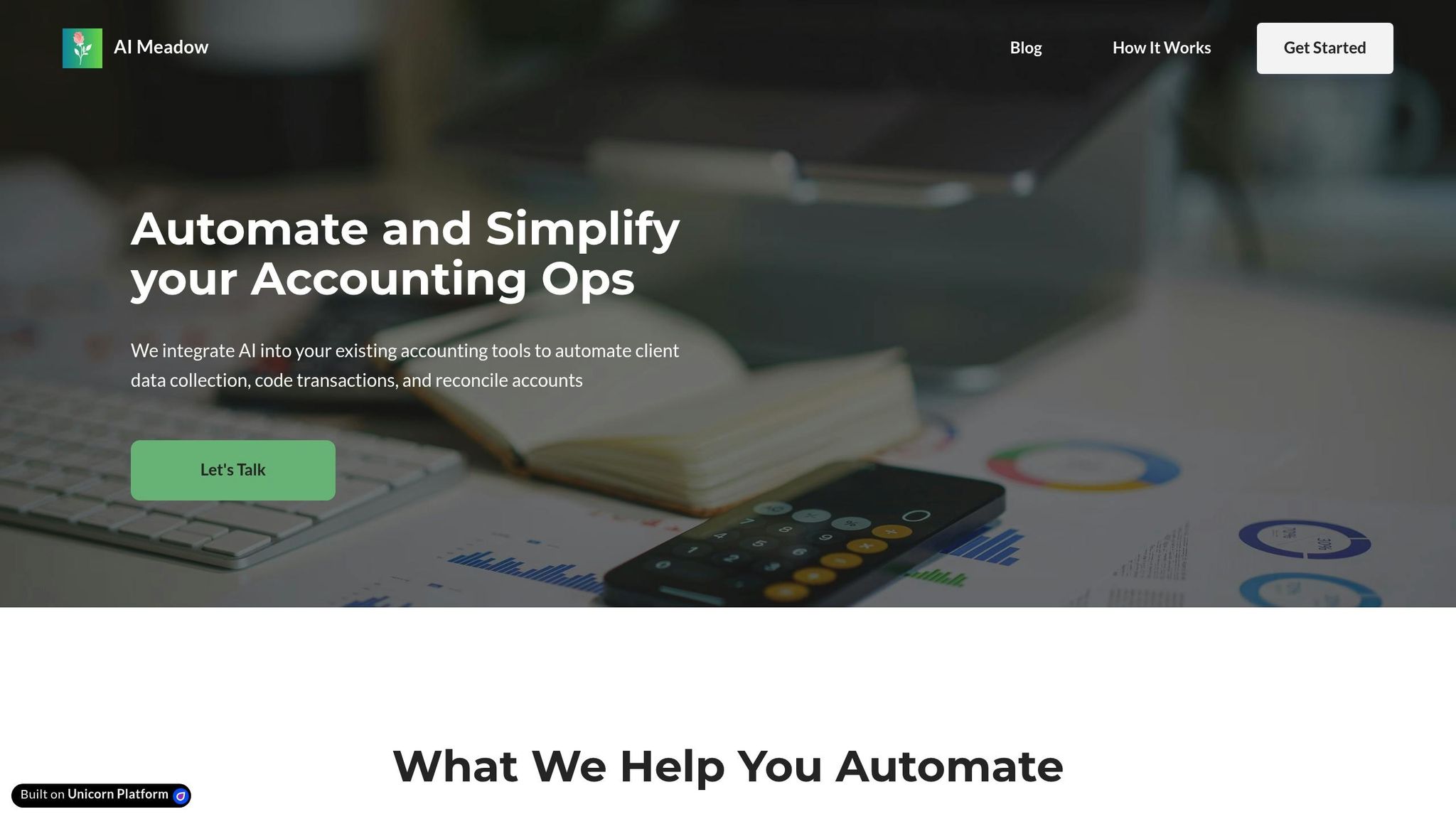AI in accounting can save time, reduce costs, and improve accuracy - but its true value often unfolds over time. For small firms, adopting AI isn't just about cutting expenses; it's about transforming workflows and enabling growth. Here's what you need to know:
- Time Savings: Automating tasks like data entry and reconciliations can cut processing time by up to 90%.
- Cost Reduction: Firms report a 20–30% drop in operating expenses using AI tools.
- Error Reduction: AI improves accuracy, reducing costly mistakes by up to 90%.
- Scalable Growth: AI allows firms to handle more clients without increasing staff.
Key takeaway: Early adoption of AI tools like AI Meadow can help small firms streamline processes, free up staff for higher-value tasks, and position themselves for long-term growth. The question is: Will your firm embrace these changes or fall behind?
Using AI & Automation In Accounting - Case Study
Current Problems in Accounting Workflows
Small accounting firms are often bogged down by manual tasks. In fact, 92% of accounting professionals admit they spend too much time on manual work. This dependence on outdated processes doesn’t just slow things down - it affects productivity, accuracy, and the potential for growth.
Even though technology is available to streamline operations, 97% of accounting firms feel they’re not using it effectively. On top of that, 75% of accountants say their workflows still rely heavily on manual effort. This gap between having the tools and using them efficiently is a major hurdle.
"Most small business owners became business owners because of their expertise or skillset in a particular industry or service and do not have formal training or experience in business... In other words, they are learning to fly the plane while it's already in the air." - Dave Bunce, Vice President of Strategic Accounts at interVal
This lack of business training often leaves firms clinging to manual methods, which slows efficiency and limits growth. Let’s break down how these manual processes specifically create challenges in key accounting tasks.
Manual Data Entry and Categorization
At the heart of accounting lies data entry and transaction categorization - tasks that are still largely manual for many firms. Sixty-three percent of accountants and bookkeepers say they spend too much time on data entry, and manual methods come with error rates between 1–5%. These errors can be costly, especially when dealing with sensitive financial data.
Even with digital tools in place, 76% of CFOs report that manual tasks still eat up too much of their teams’ time. This means that despite investing in technology, many firms are stuck with workflows that demand excessive manual effort.
Here’s a typical scenario: employees gather receipts, invoices, and bills from various sources. Then, they manually input transaction details into spreadsheets or accounting software, assign each transaction to the right general ledger account, and cross-check entries to avoid errors or duplicates. For even a moderate number of transactions, this process can take hours.
"Difficulty in tracking the status of invoices and payments can result in a lack of visibility into cash flow and liabilities." - Paul Wnek, Founder, CEO, and Principal Solutions Architect of ExpandAP
The situation worsens when firms use multiple systems that don’t integrate. Without proper integration, employees are forced to re-enter the same data across platforms, adding to inefficiency.
While manual data entry is a major pain point, these inefficiencies spill over into other critical processes, like reconciliation and month-end closing.
Reconciliation and Month-End Close Delays
Month-end close is one of the most stressful times for accountants. Only 53% of companies manage to close their books within six days, while 25% take 10 days or more. For smaller firms with lean teams, this period can feel like a race against time, as they juggle routine tasks with more strategic responsibilities.
Reconciliation, a key part of closing, involves comparing bank statements with internal records, resolving discrepancies, making journal entries for adjustments, and reviewing account balances for accuracy. Each step demands precision, and even small errors can lead to delays that ripple through the entire process.
The month-end close process often stretches teams thin, forcing them to divide their time between time-consuming manual tasks and more critical analysis. Common reconciliation problems include missing receipts, inconsistent data formats, manual coding errors, and a lack of standardized procedures. To make matters worse, many firms still rely on outdated systems or delay adopting newer technologies.
Here’s the frustrating part: 77% of accounting activities could be automated with today’s technology, according to McKinsey. High-performing firms are already taking advantage of this, using productivity tools and technology 61% more than their competitors. This creates a growing divide between firms that embrace efficiency and those stuck in manual workflows.
How AI Generates Returns in Accounting
AI is reshaping accounting by tackling inefficiencies in manual processes, delivering measurable benefits like saving time, cutting costs, and improving accuracy.
Time Savings Through Workflow Automation
AI-powered tools can reduce data processing times by up to 90%. Tasks that once took days - such as managing thousands of transactions or processing hundreds of documents - can now be completed in minutes. Users have reported over 25% time savings on reporting tasks alone . By extracting key details from invoices, receipts, and bills automatically, AI eliminates the need for tedious manual input. As HubiFi explains:
"AI empowers accountants to work smarter: By automating repetitive tasks, AI frees up finance professionals to focus on higher-level work like strategic analysis, client relationships, and providing valuable business insights." - HubiFi
Additionally, AI-driven platforms provide real-time analytics on metrics like invoice processing and team performance. This allows accountants to dedicate more time to analysis and decision-making, ultimately boosting productivity and efficiency.
Cost Savings and Reduced Labor Costs
AI doesn't just save time - it also reduces costs. A PwC survey revealed that 62% of accounting firms using AI reported cost savings alongside increased productivity. By 2025, AI is expected to cut operational costs by up to 40%. According to McKinsey, global spending on AI in accounting reached approximately $4 billion in 2023 and could climb to $10 billion by 2025. Automation could reduce manual operation time by 30% within the same timeframe, enabling firms to handle more clients without needing to expand their workforce. As BDO highlights:
"Automation allows for major advances in the speed and efficiency of your accounting output, without requiring changes to your business processes." - BDO
By streamlining routine tasks, AI reduces labor costs and ensures long-term financial benefits for firms.
Better Accuracy and Compliance
AI's precision goes beyond saving time and money - it significantly reduces errors and strengthens compliance. Unlike manual processes, which are prone to mistakes, AI systems consistently deliver high accuracy, minimizing the need for costly rework. For instance, the US Treasury Department used AI for fraud detection in 2022, recovering $375 million in 2023 alone. Dennis Shirshikov, a finance expert, elaborates:
"AI and machine learning are revolutionizing accounting and bookkeeping by automating routine tasks and providing deeper insights through data analytics. For instance, AI-driven software can now handle complex reconciliations, detect anomalies in financial data, and predict cash flow patterns with remarkable accuracy." - Dennis Shirshikov, Head of Growth, gosummer.com and Finance Professor, City University of New York
AI also helps professionals in legal, tax, risk, and compliance roles save around four hours per week - or roughly 200 hours annually. A 2024 survey by the Association of Certified Fraud Examiners predicts that the use of AI in antifraud programs will triple within two years. Enhanced accuracy not only supports compliance but also leads to better insights, improved client service, and sustainable business growth.
sbb-itb-ca9a050
AI Meadow: A Practical Solution for Small Accounting Firms

Small accounting firms in the U.S. often face challenges that their larger counterparts can avoid. Limited IT resources and tighter budgets make it harder for these firms to compete on efficiency and accuracy. That’s where AI Meadow steps in. Designed specifically for small firms, it provides tailored automation solutions that fit both their workflows and financial constraints.
AI Meadow focuses on two of the most time-consuming parts of the monthly accounting cycle: data capture with transaction categorization and reconciliation with month-end close processes. Instead of offering a generic tool, it creates custom automations that integrate smoothly with popular accounting software like QuickBooks.
According to research, 89% of accounting professionals report that automation in financial operations boosts profitability and efficiency. For small firms, these gains can mean the difference between staying competitive and falling behind. By addressing these critical workflows, AI Meadow helps small firms achieve measurable improvements and long-term benefits.
Automating Data Capture and Categorization
One of the most tedious tasks in accounting is collecting source documents - receipts, invoices, and bills - and manually entering and categorizing each transaction. AI Meadow simplifies this process by automating document collection, data extraction, and ledger categorization.
Here’s how it works: The system retrieves documents via email or secure uploads, extracts essential details like vendor names, amounts, and dates, and then auto-fills ledger categories based on historical patterns. This not only saves time but also enhances accuracy.
The impact is clear. 90% of professionals new to automation say it saves them significant time. The extracted data syncs directly with accounting software, eliminating manual data entry and improving the quality of financial records. In fact, 85% of survey respondents offering client advisory services noted that automation enhances data quality.
Improving Reconciliation and Month-End Close
Month-end close is another pressure point for accountants, often involving tight deadlines and a high risk of errors. AI Meadow streamlines this process by automating much of the reconciliation work.
The system compares bank and credit card transactions against accounting ledger entries, flagging discrepancies, duplicate entries, or missing adjustments. Instead of manually reviewing thousands of transactions, accountants receive a concise list of issues to address. AI Meadow also suggests standard journal entries - like bank fees, interest income, and recurring adjustments - based on historical data. Plus, it performs "micro-reconciliations" throughout the month, reducing surprises during the formal close process.
The benefits are substantial. AI-driven systems can automatically match over 90% of transactions, drastically cutting down on manual work. In fact, automated reconciliation can reduce reconciliation time by up to 80%. For small firms, where team members often juggle multiple roles, this time savings allows staff to focus on higher-value tasks, such as client advisory services.
Accuracy also improves significantly. Manual errors account for 95% of reconciliation mistakes, while AI-powered reconciliation is 10 times faster and 99% accurate. Additionally, machine learning algorithms adapt to each firm’s unique patterns, improving reconciliation accuracy by up to 60%. Over time, this ongoing learning makes the system even more effective, delivering increasing value and efficiency gains as the firm continues to use it.
Long-Term Business Gains Beyond Immediate Returns
While AI delivers immediate benefits, its long-term impact on business operations can be transformative. Beyond streamlining processes, AI drives strategic advantages that redefine how firms operate, particularly in accounting. These deeper benefits not only improve efficiency but also establish a foundation for sustained competitive growth.
The AI accounting market is expected to expand significantly, from $6.68 billion in 2025 to $37.60 billion by 2030. This projected growth highlights the increasing recognition of AI's potential to go beyond automating routine tasks.
Shifting Focus to Strategic Roles
One of the most impactful long-term outcomes of AI adoption is how it allows accountants to step into more strategic roles. By automating repetitive tasks, AI frees up time for professionals to focus on high-value activities like data analysis, forecasting, and business advisory services. This transition enhances the quality of services and boosts a firm's competitive edge.
AI also transforms accountants into trusted advisors rather than just compliance enforcers. With real-time data processing, AI systems can monitor client information continuously, flagging anomalies or uncovering opportunities in real time. For smaller firms, this capability enables smarter, data-driven decisions in financial planning and management.
This evolution not only improves service delivery but also helps firms build scalable and forward-thinking operations.
Enabling Scalable Growth
AI-driven automation positions firms for growth without requiring proportional increases in staffing. The efficiency gains achieved through AI allow businesses to scale operations while keeping costs in check. These savings can then be reinvested into strategic initiatives that enhance market positioning.
Jennifer Wood, a Partner at Bonadio Group, underscores this advantage:
"Generative AI can level the playing field between smaller and larger firms by providing smaller firms with tools that traditionally required significant investment in human resources and technology."
Consider the example of Next Dimension Accounting in Australia, which experienced 200% growth over two years thanks to AI-powered solutions. This growth was achieved without adding to their headcount, showcasing how AI enables faster, more accurate service delivery. Additionally, AI helps firms navigate staffing shortages by automating routine tasks, freeing employees to focus on more impactful responsibilities.
Cloud-based AI solutions also play a crucial role by reducing upfront costs and offering the flexibility needed for future expansion. Firms leveraging AI can streamline client acquisition and identify new market opportunities, further strengthening their growth potential.
As technology continues to advance, early adopters gain a significant edge by building institutional expertise and securing competitive advantages. The combination of operational efficiency, enhanced service quality, and strategic foresight creates a long-term advantage that only grows with time.
Conclusion: Achieving Long-Term Returns with AI in Accounting
AI isn't just about cutting costs - it’s about delivering long-term value that redefines how accounting firms operate. Recent studies highlight this potential, showing up to 30% reductions in operational costs, a 90% drop in manual errors, and a positive ROI within the first year for 82% of early adopters.
As Rebeca Bichachi from NetSuite explains, AI enables accounting teams to focus on what truly matters: "AI lets accounting teams concentrate on consultative and high-value activities, rather than transactional tasks. This transition is quite valuable but may require changes in skills and mindset". This shift allows firms to take on more strategic advisory roles, strengthening client relationships and tapping into higher-margin opportunities.
For smaller firms, the time to act is now. Research from McKinsey underscores that many accounting tasks are ripe for automation, and 40% of professional services companies are planning to increase their AI investment. Early adopters gain an edge, building expertise and positioning themselves in ways that competitors may find hard to match later.
Platforms like AI Meadow offer an accessible starting point for small firms ready to embrace these benefits. By automating tasks like data capture, transaction categorization, and reconciliation, AI Meadow helps reduce the manual workload that often drains staff time. Its integration with QuickBooks and focus on streamlining month-end close processes directly address common pain points, allowing firms to shift their focus to advisory services and long-term growth.
The potential is clear: 67% of professional services companies believe AI will have a transformative impact on their business. Firms that adopt automation today can scale efficiently without needing proportional staffing increases, improve accuracy, and free up their teams to deliver the kind of advisory services that build lasting client value.
The question is - will your firm take the lead or risk being left behind?
FAQs
How can small accounting firms use AI to reduce manual tasks and improve efficiency?
Small accounting firms have a lot to gain from using AI to handle tedious tasks like data entry and transaction categorization. By automating these processes, staff can dedicate more time to work that adds real value. For example, AI can collect receipts and invoices, pull out key details such as amounts and dates, and even suggest the right ledger categories. This not only saves time but also cuts down on errors, leading to more accurate records.
AI can also simplify month-end tasks like reconciliation. It can spot discrepancies, recommend journal entries, and ensure clean, organized data flows directly into your accounting software. With these tools in place, firms can operate more efficiently, boost productivity, and deliver better client service - laying the groundwork for long-term growth.
What are the long-term benefits of using AI in accounting beyond saving time and money?
Implementing AI in accounting offers more than just quick cost reductions - it sets the stage for lasting improvements. By taking over repetitive tasks, AI gives accountants the freedom to focus on more impactful work, like financial planning and providing tailored advice to clients. This not only drives efficiency but also helps build stronger, more meaningful client relationships.
Another major advantage is how AI enhances decision-making. By processing and analyzing massive amounts of data, it delivers actionable insights, making financial forecasting and risk assessment far more precise. On top of that, AI strengthens compliance measures and fraud detection, minimizing risks while reinforcing client trust. These advancements make accounting practices more efficient, scalable, and prepared for the challenges of tomorrow.
How does AI Meadow help small accounting firms save time and improve efficiency with automation?
AI Meadow is a game-changer for small accounting firms, helping them simplify their workflows by automating tedious, repetitive tasks in two critical areas: data capture and transaction categorization and reconciliation and month-end close. By taking over these time-consuming duties, firms can cut down on manual effort, minimize mistakes, and dedicate more energy to tasks that truly add value.
Here’s how it works: AI Meadow automatically collects client documents, pulls out essential details like vendor names and amounts, and organizes transactions directly within accounting software. When it comes to month-end closing, it tackles the heavy lifting by spotting discrepancies, recommending journal entries, and handling ongoing reconciliations to prevent last-minute headaches. These tools allow small firms to work smarter, paving the way for smoother operations and sustainable growth.


